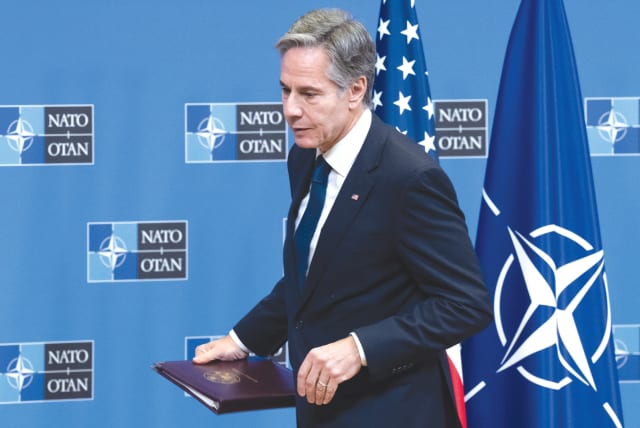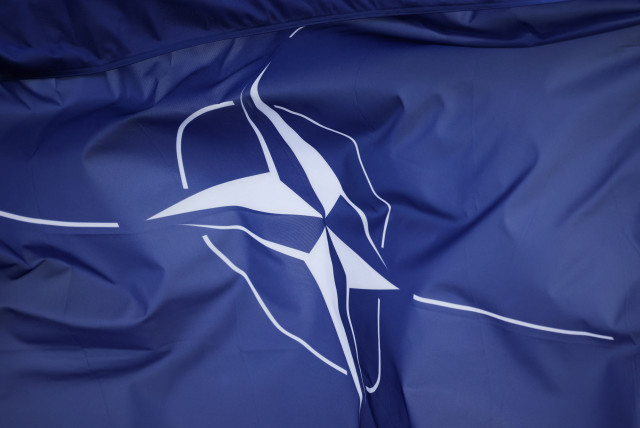'Ironclad' US-Israel relations not strong enough to join counterstike on Iran - opinion

Is America’s ironclad relationship with Israel actually more malleable than so adamantly advertised by the Biden White House?
The brazen attacks by Iran and its proxies (Hamas, Hezbollah, Houthis) are not simply attempts to cow Israel. They also pose a looming threat to America’s well-being. Here’s why.
In responding to Iran’s unprecedented layered onslaught using kamikaze drones, ballistic rockets, and cruise missiles calculated to overwhelm Israel, it should now be crystal clear to Israel and the US that the notion of a “proportional” response is simply an academic argument devoid of compelling relevance.
Based upon Iran’s mammoth aerial attack in response to Israel’s comparatively trifling strike on an annex of Iran’s Embassy in Damascus, proportionality is dead, at least to the powers-that-be in the Islamic Republic of Iran.
Indeed, more than four decades have elapsed during which the West’s diplomatic endeavors have miserably failed to curry Iran’s compliance with international norms of behavior.
It should, therefore, be unmistakably evident to the world’s characteristically myopic observers that proportionality and diplomacy with Iran are non-starters; in actuality, they are deafening duds.
However, if Israel were a member of NATO, then under the provisions of Article Five, the United States would have been required to actively join any counter strike against Iran. But Israel is merely America’s non-NATO ally. That subordinate status subtly suggests that while America’s “ironclad” relationship with Israel is historically strong, it is subject to corrosion in given conditions.
The US-Israel relationship is being tested
Most pointedly, the strength of that ironclad relationship is now being tested in America by a growing rabble of the Democratic party’s extreme left wing. It was those pro-Palestinian protesters who actually cheered Iran’s enormous assault. That elicited Republican Senator Marco Rubio’s infuriated statement that the cheering pro-Palestinian protesters were “antisemitic, anti-Israel, and pro-terrorist. They are not peace activists… who do not cheer massive attacks on other countries.”
As such, it is clear that America’s reticence to join any Israeli counter strike against Iran was, and is, conditioned not only by whatever “ironclad” actually means, but also by the vagaries of America’s extremist politics combined with the unenviable entanglements of the always Machiavellian Mideast.
It is in that broad context that Dana Stroul, the former top Middle East policy official at the Pentagon, felt compelled to acknowledge that, “Given how significant this attack was, it is difficult to see how Israel cannot respond!”
SO WHY has the Biden administration expressly distanced itself from pro-actively joining Israel in any responsive military confrontation with Iran?
Furthermore, why does the United States appear comfortable standing at “parade rest” regarding its “ironclad” representations? What is it about Iran’s globally recognized status as the world’s premier purveyor of terrorism that gives America pause precluding action against Iran’s relentless belligerence to both Israel and the US? Why is it that the Biden administration seems to be standing down instead of rising up while joining arms and armaments against Iran’s extremist Islamist regime?
How and why is it that America’s ironclad relationship with Israel seems to bend ever so slightly before bowing – if not buckling – in the face of Iran’s economic and military support of no less than 20 terrorist entities around the globe?
Is America’s ironclad relationship with Israel actually more malleable than so adamantly advertised by the Biden White House? If so, why so? Or, and I suggest this with great reluctance, is the term “ironclad” conveniently subject to diplomatic prevarication?
That said, it must also be noted that Iran’s prodigious attack on Israel unequivocally distances Iran from any semblance of the shadow war against Israel that Iran has been waging through its proxies. Hamas, Hezbollah, and Yemen’s Houthis (among others) are merely wittingly servile appendages of the international pariah that Iran has regrettably chosen to become.
Iran’s attack on Israel represents a historic first. In spite of Iran’s recurring statements that it intends to wipe Israel off the Mideast map, this assault was the first time that Iran has launched an attack directly from its home soil on Israel’s homeland.
That verity must not be cavalierly discounted; it crossed a deeply red line. It reveals a dramatic change not only of Iran’s mindset, but also of its physical predisposition to act in accord with its relentlessly professed intentions against both Israel and the United States.
America surely does not seek nor want a wider war that could engulf the Mideast and disrupt global commerce – particularly in the critical oil sector. That attitude is certainly understandable.
But simultaneously it is also critical to recognize that since 1979, when Ayatollah Ruhollah Khomeini came to power as Iran’s Supreme Leader, that government’s officials, plus a great many Iranian citizens, have relentlessly chanted: “Death to America” and “Death to Israel.” That mantra is omnipresent whenever Israel or the US is mentioned in Iran.
Indeed, Israel unquestionably understands the fatal thrust of those rabid slogans. In a very limited, but exceedingly illuminating way, that is because Iran has already expunged Israel’s name from all of its maps. Instead, the name Palestine identifies the region that is still accurately identified as Israel by the world’s bona fide cartographers.
This all leaves me with two questions: What is so hard to understand about Iran’s “Death to America” chant, and what, if anything, does the US intend to do about it?
The writer lectures globally on world affairs and is director of The Centre for Strategic Geopolitics.
Jerusalem Post Store
`; document.getElementById("linkPremium").innerHTML = cont; var divWithLink = document.getElementById("premium-link"); if (divWithLink !== null && divWithLink !== 'undefined') { divWithLink.style.border = "solid 1px #cb0f3e"; divWithLink.style.textAlign = "center"; divWithLink.style.marginBottom = "15px"; divWithLink.style.marginTop = "15px"; divWithLink.style.width = "100%"; divWithLink.style.backgroundColor = "#122952"; divWithLink.style.color = "#ffffff"; divWithLink.style.lineHeight = "1.5"; } } (function (v, i) { });

